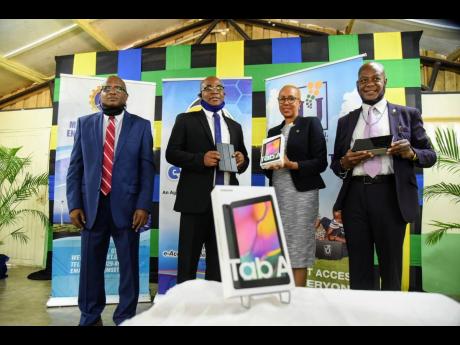Teachers being equipped with tablets to support online learning
When the new academic year begins in September, teachers at institutions across the island will be better equipped and prepared to deliver their lessons.
They are being gifted with tablet computers for personal use as well as to assist in delivering content in a virtual environment. This is particularly in light of COVID-19, which has resulted in the closure of school plants and the transition to online and distance learning.
The initiative falls under the Tablets for Teachers programme, through which 25,000 public-school teachers across the island will receive devices.
It is part of the Government’s wider ‘Tablets in Schools Project’, which aims to provide students, teachers and schools with the necessary technology to support learning.
Last week, devices were handed over to teachers at the Balcombe Drive Primary and Junior High and Hope Valley Experimental schools in St Andrew.
Principal of Balcombe Drive Primary and Junior High, Yvette Foster, said that the institution, like many others across the island, has been impacted by the COVID-19 outbreak, and thanked the Government for the tablets.
“We are extremely happy … we are just overjoyed. We are going to use them to enhance our learning,” she said.
Principal at Hope Valley Experimental, Anthony Grant, for his part, said that acquisition of the devices “means a whole lot because now we are in a position where all the teachers have the gadgets to deliver learning and do their research”.
“So it’s a phenomenal step in terms of how we are going to be able to reach all our children with face-to-face classes and when they are doing the distance learning,” he said at the handover ceremony at the institution’s University Road address.
“It’s really a good gesture. It really means now that we are in a better space to plan and prepare for all our children and to ensure that every one of them is able to access education in a continuous and meaningful way,” he added.
Hope Valley Experimental, founded in 1972 by orthopaedic surgeon Professor Sir John Golding, is one of the few schools in the island that cater to the educational development of disabled and able-bodied children in the same setting.
Mixed modality approach
There are 720 students on roll, the majority of whom are able-bodied. However, there are students who suffer from physical challenges such as cerebral palsy and muscular dystrophy.
Grant said that a mixed modality approach, including WhatsApp, was used to engage the students during the latter part of the just-concluded academic year as a result of the impact of COVID-19 on the education sector.
“It really went well. We reached almost 100 per cent of our students during that time. All the teachers responded favourably, worked diligently throughout and we were able to contact almost 100 per cent of our students during the period,” he said.
During the ceremony, the school was also presented with a multifunctional printer from Productive Business Solutions.
Meanwhile, Grant said preparations are in “high gear” for the reopening of the school plant in September.
Minister of Science, Energy and Technology Fayval Williams, in her remarks, said the Government has been investing in equipping schools with the necessary technology prior to the onset of COVID-19.
She informed that the distribution of 65,000 tablet computers to teachers and students, under the Tablets in Schools Project, will be completed this fiscal year.
In addition to the 25,000 for public-school teachers, the number includes 40,000 for infant, primary, and special-education schools, as well as state-care facilities and teachers’ colleges.
Williams noted that the roll-out of the devices will assist in bridging the digital divide and create a digitally inclusive society where no one gets left behind.
“We need to adequately train our teachers to use the technology, as well as equip our schools with the necessary infrastructure that is needed to take the schools into our homes, on the street corner and just about everywhere. This is directly in tandem with the United Nations Sustainable Development Goal 4, which calls for inclusive and quality education for all,” she pointed out.
Meanwhile, Chief Executive Officer of e-Learning Jamaica (e-LJam) Keith Smith said that just under 18,000 of the 25,000 devices for teachers are on the island, and the remainder are to arrive later this month.
“We commenced a couple weeks ago the formal roll-out, and we’ve already completed the parishes of Portland and St Thomas,” he said, noting that “the team will be mobilising in Trelawny, in St Mary, and Westmoreland”.
Jamaica Post has been assisting with the distribution of the tablets.
The Tablets for Teachers programme is part of an agreement between the Government and the Jamaica Teachers’ Association (JTA) to provide each teacher in public schools with a 10-inch tablet computer as part of their compensation package.
The initiative involves collaboration among the Ministry of Science, Energy and Technology; Ministry of Finance and the Public Service; Ministry of Education, Youth and Information; e-LJam; and the JTA.

